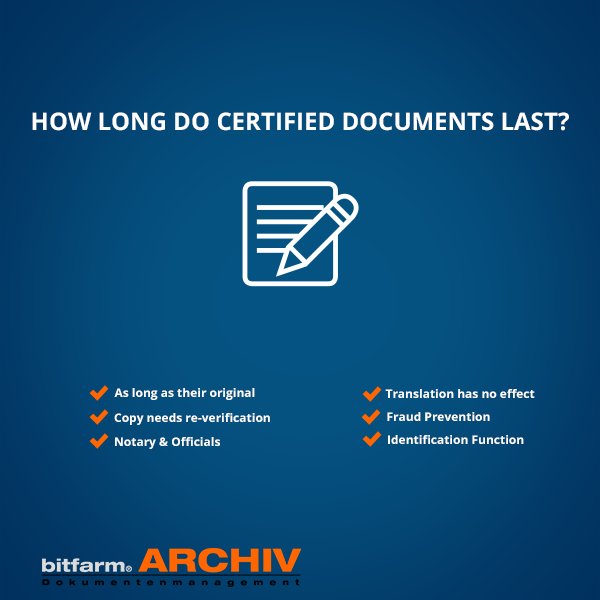Certified documents, copys & their validity period: How long do they last?
Validity period of certified documents
The validity period of a certified document usually depends on its type and certification. For example, a birth certificate has unlimited validity, whereas a police clearance certificate, in turn, is valid for only one year.
In confidential cases, a lawyer or data protection officer who specializes in this area should also be consulted. Here is a small overview of important documents and their validity period. This may vary depending on the state.
- Driver Licenses: Mostly 8 years
- Birth Certificate: Unlimited
- Passport: 10 years
-
Social Security number: Unlimited
-
Invoices: 6 years (if unpaid)
How long do certified copies last?
As a rule of thumb, the certified copy lasts as long as its original. However, this depends on the type of document and validation in each individual case. It is important that the copies are signed or stamped again by a notary or an official body.
The copy loses its validity without re-verification and is often no longer recognized. The disadvantage of the copies is therefore that renewed costs and effort are incurred. Thus, it should be estimated in advance whether the original is not already sufficient. However, a legal advisor should be consulted for this.
Also, a different language within the copy has no effect on the validity. Although, it is important that this is certified by a translator, if it is required depending on the type.

Why are they important?
Certification makes sure that a copy's content is identical to that of the original. This certification does not attest to the original's authenticity or validity, but simply to the content correspondence between the original and the copy.
It can also confirm authenticity, which prevents fraud. Likewise, in some cases, they have an identification function that can be used to identify individuals and companies. Especially in the case of confidential and important documents, the risk of forgery must be minimized, otherwise there is a risk of major financial loss.
Who is allowed to certify?
In theory, any organization with a service seal can authenticate papers. The cost of document authenticity validation varies from office to office. You'll need both the original document, such as a certificate, and the accompanying duplicate to get a document authenticated. Expect to pay between 4 and 10 dollars each page. The following are some locations where certificates and other documents can be notarized:
- Citizens' offices, municipal and district administrations, and city councils
- Civil registry office: Certificates of birth, marriage, and death
- Notaries and courts: Prices vary depending on the value of the firm; certifications cost around 10 dollar.
-
Schools and institutions that have awarded certificates. Frequently, a free certification of the graduation certificate is available.
- Churches and health insurance providers. However, keep in mind that not all credentials are approved by these organizations. When applying for university spots, certain universities (learn more about document management systems for higher education), for example, only accept certifications from administrative agencies.
Are you interested in more information around the topic of document management? We glady invite you to our YouTube series (please enable english subtitles) and are looking forward to your E-Mail. In this context, we are also inviting you to check out our free document software, bitfarm-Archiv.
Glossary index | Home | Software | Services | Document Management | FAQ | Contact
